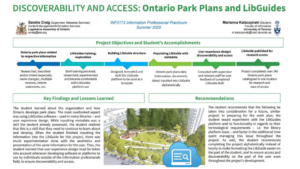WHAT IS IT?
A practice-based experience where students observe or assist a licensed or registered professional through the application of disciplinary concepts in a professional setting. This type of experience is typically a requirement for professional licensure or certification and is primarily intended to support professional competency development. Students do not have an independent workload/caseload while on practicum.
IMPORTANT CONSIDERATIONS
Eligibility:
- Students need to be enrolled in an academic program that offers professional practicums.
- Eligibility criteria differs for each program. Keep in mind that some academic programs require admission directly from secondary school or from an undergraduate degree.
Duration:
- The duration of a professional practicum varies and will be determined by students’ academic program.
Recognition and / or compensation:
- Professional practicum opportunities are unpaid since the work is done in a supervised setting and students will not typically have their own workload or caseload. Students will receive course or program credit.
Accessibility:
- Inclusion in EL is achieved when an experience supports learning for all students. In keeping with the Ontario Human Rights Code, the University of Toronto has a commitment to an equitable learning environment for people with disabilities. It is important to engage in an interactive process to determine the optimal and most appropriate accommodations for individual students engaged in experiential learning.
- If a student requires an accommodation related to a professional practicum, you may wish to connect with one of the accessibility services offices at the University of Toronto. Staff at these offices will advise you on the disclosure of accommodation requirements as well as support you through the process of determining and negotiating effective accommodations for the student’s individual circumstances.
- Student support offices strive to create a safe and comfortable community where students have opportunities to discuss navigating barriers, find peer support and learn about various academic and social opportunities.
ADDITIONAL INFORMATION
- Review the Guidelines & Procedures page to further understand which partnership agreements, insurance and liability coverage and health and safety policies are applicable to professional practicums. The Experiential Learning Risk Management Matrix provides a one-page overview.
- An unpaid student placement agreement between the University of Toronto and the partner organization needs to be in place prior to students engaging in a professional practicum. This agreement will clearly outline items such as responsibilities, provisions and policies to be followed for both the University and the partner organization.
- Students engaging in a professional practicum receive workplace insurance coverage through the University or Ministry of Colleges and Universities.
BENEFITS
- Participation in a professional practicum can help develop students’ skills for a particular profession.
- In many cases, a specific number of professional practica hours are required to meet graduation and / or accreditation requirements.
- Students have the opportunity to experience the workplace with direct supervision and support.






